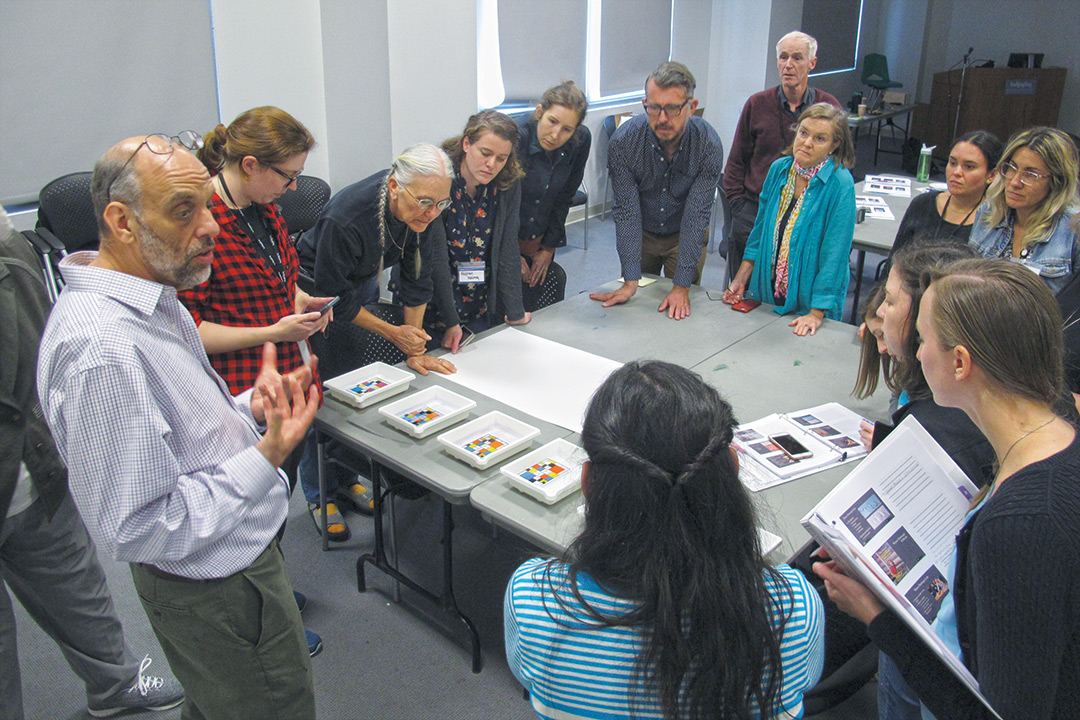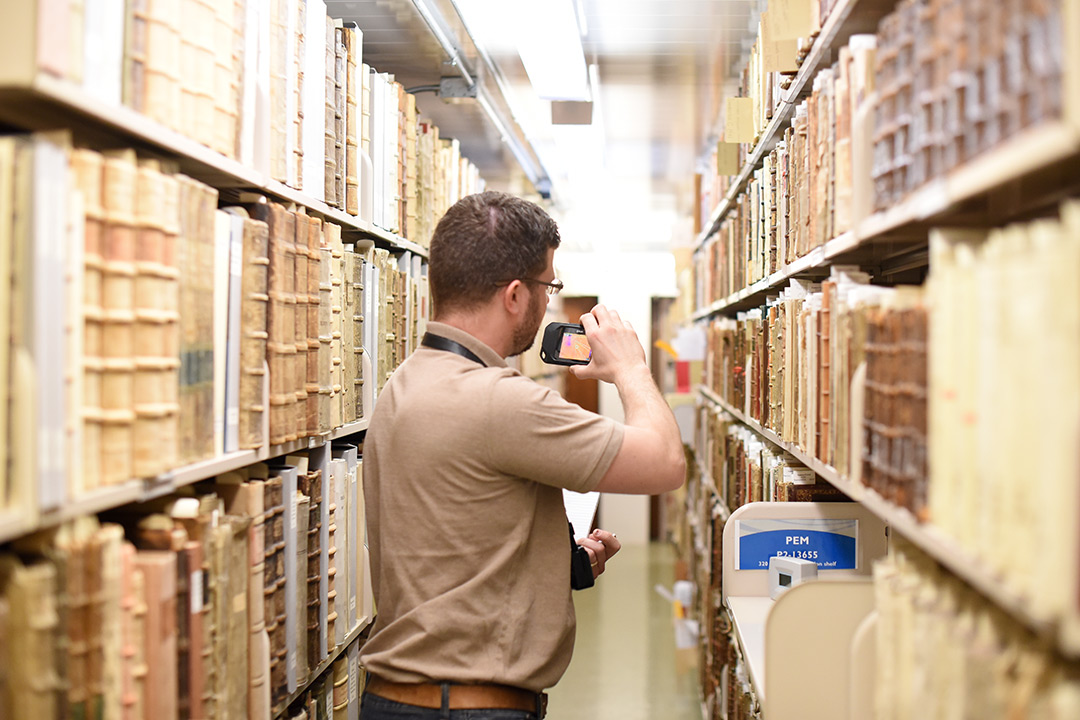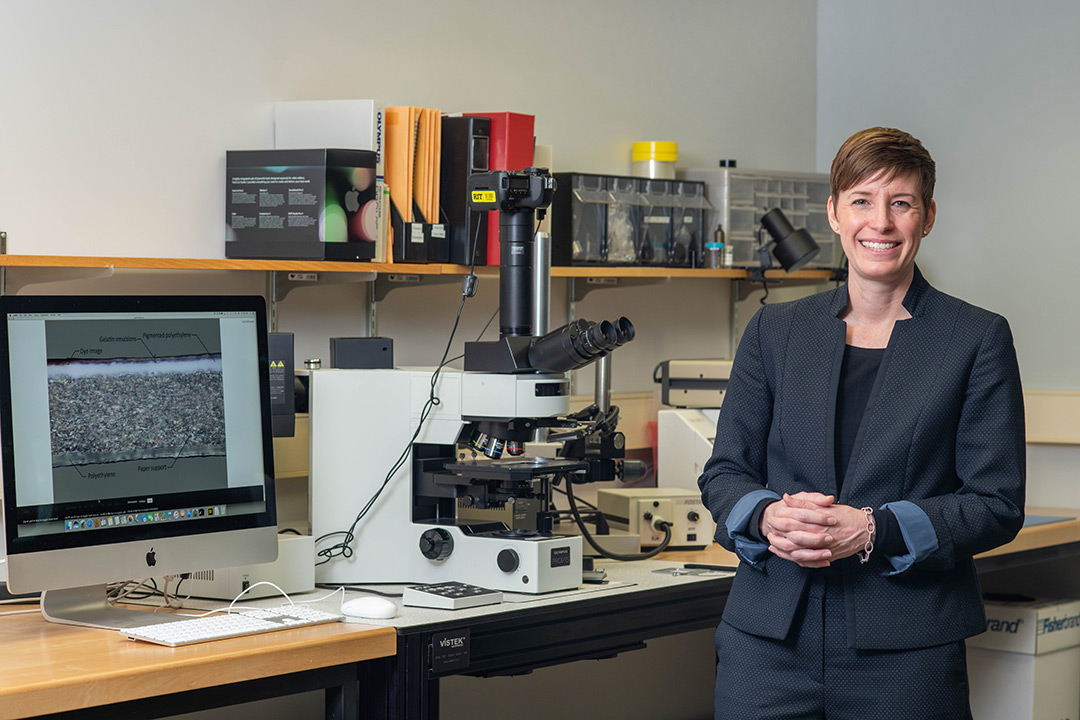Informing the preservation of cultural heritage collections
Gabrielle Plucknette-DeVito
Jennifer Jae Gutierrez, executive director, said the Image Permanence Institute “has always looked to the field to identify preservation needs and challenges,” and will do so again with assessment initiatives that will help define IPI’s future research agenda.
For the second time in its nearly 35-year existence, RIT’s Image Permanence Institute (IPI) is
at a turning point.
Devoted to scientific research that supports the preservation of library, museum, and archives collections, IPI’s original focus at its founding in 1985 was the preservation of photography, microfilm, cinema, and other forms of recorded information.
In the 1990s, IPI’s most significant contributions related to new approaches for quantifying collection risks and rates of deterioration. Libraries, archives, and museums at that time were particularly concerned with the alarming rate at which cellulose acetate-based materials were actively deteriorating.
 Jennifer Burger Daniel Burge, left, senior research scientist at IPI, teaches a workshop on digital print preservation at the Ringling Museum in Sarasota, Fla. IPI offers workshops in multiple regions throughout the United States.
Jennifer Burger Daniel Burge, left, senior research scientist at IPI, teaches a workshop on digital print preservation at the Ringling Museum in Sarasota, Fla. IPI offers workshops in multiple regions throughout the United States.Laboratory experiments at IPI demonstrated that as cellulose acetate film deteriorates—creating its own acidic environment—the rate of deterioration accelerates and significant loss of collection materials can occur in a short amount of time. Accelerated aging studies conducted at IPI demonstrated the potential of low temperature and low humidity storage environments to minimize the chemical decay of cellulose acetate film.
“IPI has always looked to the field to identify preservation needs and challenges,” said Jennifer Jae Gutierrez, executive director of the research center in the College of Art and Design. “Our focus today is identifying how to address the needs that span across collections through research, resource development and deployment, and professional training opportunities.”
All of IPI’s early research on the inherent vices of photographic materials pointed to the critical role of environmental conditions—specifically temperature and relative humidity—on the impact of material decay, both natural aging and other forms of deterioration.
This led IPI to broaden its research focus almost two decades ago to include virtually any materials found in cultural institutions worldwide by also focusing on the role of environmental management in preserving cultural heritage collections.
 University of Kansas Libraries Christopher Cameron, sustainable preservation specialist at IPI, uses an infrared camera to evaluate temperature variations in collection storage at University of Kansas Libraries.
University of Kansas Libraries Christopher Cameron, sustainable preservation specialist at IPI, uses an infrared camera to evaluate temperature variations in collection storage at University of Kansas Libraries. Support from federal and private foundations is critical in the development and dissemination of IPI’s research.
The Andrew W. Mellon Foundation, the National Endowment for the Humanities, the Institute of Museum and Library Services, and the Samuel H. Kress Foundation are all supporting 2019-20 projects.
Current IPI research initiatives include projects that will inform the recovery of water-damaged inkjet prints in cultural institutions that have experienced water emergencies, and improving preservation environmental management strategies.
Additional education initiatives include workshops and webinars about the identification and care of digitally printed materials, training allied professionals in collecting institutions how to establish sustainable environmental management programs, and enhancing IPI’s online web resource Graphics Atlas.
As Gutierrez marks her second year as head of the academic research center—arriving on campus after distinguishing herself with conservation roles at the University of Arizona and University of Delaware—IPI continues to evolve to meet the preservation challenges of cultural institutions, and upcoming assessment initiatives will help define IPI’s future research agenda.
Grant to assess research needs
A grant awarded late last year from the Mellon Foundation will support assessment initiatives to inform and strengthen IPI’s short- and long-term research goals and institutional planning.
“The vast majority of libraries, archives, and museums around the world do not have scientific researchers on staff to research solutions to the challenges associated with preserving cultural heritage collections,” Gutierrez noted.
“These cultural institutions depend on large federal and privately funded institutions with robust research programs, national and international preservation organizations, and a small number of university-based research centers to address their preservation research needs,” she added. “IPI has been a valuable contributor to this important need for nearly 35 years.”
As IPI plans for long-term research goals that will best serve the preservation needs of collecting institutions, the Mellon-funded initiative will enable research that will engage and solicit critical feedback from collections staff, preservation researchers, and conservation educators throughout the preservation community to identify critical research needs and priorities in the field.
“Through the Mellon grant, our research program will become a facilitator for national conversations about preservation research,” Gutierrez said.
“It is hoped that working meetings that are part of this project will also serve as pilots for future meetings and establish a new role for IPI’s research program as a facilitator of multi-institutional preservation research discussions and collaborations,” she added. “Establishing a network for regularly discussing preservation research needs and current initiatives at various institutions will enhance research planning at both IPI and throughout the preservation research community.”
As IPI prepares to mark its 35th anniversary in the fall of 2020, Gutierrez and her staff have begun plans to host a collaborative symposium at RIT that will include professional development workshops and sessions on such topics as modern inkjet preservation, chaired by IPI researchers. IPI held a symposium at the Library of Congress in Washington, D.C., in 2010 to mark its 25th anniversary.
Gutierrez is excited for what lies ahead.
“This is a good time to take a step back and look at the field’s needs and determine how we best position ourselves going forward,” she said. “There’s a lot of great research happening now, and looking ahead and planning for what comes next is exciting.”
Research and education projects
The Image Permanence Institute, an academic research center in RIT’s College of Art and Design, has a full slate of research projects through 2019-20.
The impact of temperature transitions, short-term and seasonal, on the moisture content of library and archive collections
- Description: A three-year research project focused on the impact of environmental transitions on moisture content in library and archive collections.
- Funded by: National Endowment for the Humanities, Division of Preservation and Access, Research and Development Program
- Project period: January 2018-December 2020
- Funding awarded: $349,149
- Principal investigator (PI): Jean-Louis Bigourdan,senior research scientist
Digital print preservation: education and training for cultural heritage professionals
- Description: A two-year project designed to educate and train cultural heritage professionals on the proper identification and care of modern, digitally printed materials.
- Funded by: National Endowment for the Humanities, Division of Preservation and Access, Education and Training Program
- Project period: January 2018–December 2019
- Funding awarded: $195,049
- PI: Daniel Burge, senior research scientist
Evaluating the potential for freezing and freeze drying to improve water emergency outcomes for inkjet prints
- Description: A three-year research project to determine if freezing and freeze drying are safe and effective for recovery of modern museum inkjet print collections affected by water emergencies.
- Funded by: Institute of Museum and Library Services, National Leadership Grant for Museums Program
- Project period: October 2018-September 2021
- Funding awarded: $453,054
- PI: Daniel Burge, senior research scientist
Enhancing the educational value and longevity of Graphics Atlas
- Description: A one-year project to enhance IPI’s online resource Graphics Atlas (www.graphicsatlas.org), an interactive digital resource that guides users through a process of identification and characterization of graphic print media.
- Funded by: Samuel H. Kress Foundation, Digital Resources Grant Program
- Project period: January 2019–December 2019
- Funding awarded: $17,000
- PI: Al Carver-Kubik, research scientist
Training sustainable environmental management teams for cultural institutions
- Description: A two-year project focused on improving and increasing the capacity of humanities collections professionals to independently establish and maintain sustainable environmental management programs.
- Funded by: National Endowment for the Humanities, Division of Preservation and Access, Education and Training Program
- Project period: January 2019-December 2020
- Funding awarded: $199,801
- PIs: Christopher Cameron, sustainable preservation specialist, and Kelly Krish, preventive conservation specialist
Assessment initiatives for institutional planning at the Image Permanence Institute
- Description: An 18-month project including two assessment initiatives that will inform and strengthen institutional planning at IPI.
- Funded by: The Andrew W. Mellon Foundation, Scholarly Communications Program
- Project period: January 2019–June 2020
- Funding awarded: $165,000
- PI: Jennifer Jae Gutierrez, executive director













